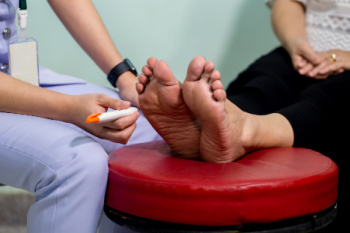

Orthotics play an essential role in alleviating various foot and lower limb conditions. When prescribing orthotics, several factors are considered, including biomechanical alignment, patient aesthetics, compliance, and joint stability. Biomechanical assessments evaluate gait patterns, foot structure, and joint range of motion to determine the most effective orthotic design. Aesthetics consideration involves ensuring that orthotics fit comfortably into the patient's shoes and lifestyle. Patient compliance is vital for long-term success, as orthotics must be worn consistently to achieve desired outcomes. Custom-made orthotics are preferred for their tailored fit and targeted support. They address specific biomechanical issues, providing support, stability, and alignment correction as needed. These orthotics are crafted based on precise measurements and molds of the patient's feet, ensuring optimal functionality and comfort. If you would like to learn how custom-made orthotics can improve your mobility and quality of life, it is suggested that you schedule an appointment with a podiatrist for an evaluation and further discussion.
If you are having discomfort in your feet and would like to try orthotics, contact Dr. Todd Goldberg from Complete Family Foot Care Center. Our doctor can provide the care you need to keep you pain-free and on your feet.
What Are Orthotics?
Orthotics are inserts you can place into your shoes to help with a variety of foot problems such as flat feet or foot pain. Orthotics provide relief and comfort for minor foot and heel pain but can’t correct serious biomechanical problems in your feet.
Over-the-Counter Inserts
Orthotics come in a wide variety of over-the-counter inserts that are used to treat foot pain, heel pain, and minor problems. For example, arch supports can be inserted into your shoes to help correct overarched or flat feet, while gel insoles are often used because they provide comfort and relief from foot and heel pain by alleviating pressure.
Prescription Orthotics
If over-the-counter inserts don’t work for you or if you have a more severe foot concern, it is possible to have your podiatrist prescribe custom orthotics. These high-quality inserts are designed to treat problems such as abnormal motion, plantar fasciitis, and severe forms of heel pain. They can even be used to help patients suffering from diabetes by treating foot ulcers and painful calluses and are usually molded to your feet individually, which allows them to provide full support and comfort.
If you are experiencing minor to severe foot or heel pain, it’s recommended to speak with your podiatrist about the possibilities of using orthotics. A podiatrist can determine which type of orthotic is right for you and allow you to take the first steps towards being pain-free.
If you have any questions please contact our office located in Littlestown, PA . We offer the newest diagnostic and treatment technologies for all your foot and ankle needs.

Pregnancy brings about a multitude of changes in a woman's body, including the feet. As the body undergoes hormonal shifts and weight gain, it is not uncommon for expectant mothers to experience foot pain and discomfort. One common area of foot pain during pregnancy is the arches, as the added weight can cause the arches to flatten, leading to strain and discomfort. Additionally, swelling of the feet and ankles, known as edema, is a prevalent issue, particularly in the later stages of pregnancy. This swelling can cause tightness and discomfort in various areas of the feet. Another common source of foot pain during pregnancy is the heels, as the increased weight and changes in posture can place extra pressure on the heel area, resulting in pain and tenderness. If you have foot pain during your pregnancy, it is suggested that you consult a podiatrist who can offer you relief tips during this transformative time.
Pregnant women with swollen feet can be treated with a variety of different methods that are readily available. For more information about other cures for swollen feet during pregnancy, consult with Dr. Todd Goldberg from Complete Family Foot Care Center. Our doctor will attend to all of your foot and ankle needs.
What Foot Problems Can Arise During Pregnancy?
One problem that can occur is overpronation, which occurs when the arch of the foot flattens and tends to roll inward. This can cause pain and discomfort in your heels while you’re walking or even just standing up, trying to support your baby.
Another problem is edema, or swelling in the extremities. This often affects the feet during pregnancy but tends to occur in the later stages.
How Can I Keep My Feet Healthy During Pregnancy?
If you have any questions please feel free to contact our office located in Littlestown, PA . We offer the newest diagnostic and treatment technologies for all your foot and ankle needs.

Foot neuropathy, a nerve disorder, presents a variety of challenges for individuals experiencing symptoms. Neuropathy occurs when nerves in the feet are damaged, leading to sensations of numbness, tingling, burning, or sharp pain. This condition can significantly impair mobility and diminish quality of life. Diagnosing foot neuropathy involves a comprehensive evaluation by a podiatrist, typically starting with a thorough medical history and physical examination. This foot doctor may perform various tests to assess nerve function and rule out other potential causes of foot symptoms, such as diabetes or vitamin deficiencies. Electromyography, or EMG, nerve conduction studies, and imaging tests, such as MRI scans or ultrasounds, may be used to confirm the diagnosis and determine the extent of nerve damage. Early detection and diagnosis of foot neuropathy are essential for initiating appropriate treatment strategies aimed at managing symptoms, preventing further nerve damage, and improving overall foot health and function. If you have any of the above symptoms in your feet, it is strongly suggested that you visit a podiatrist who can help you to manage neuropathy.
Neuropathy
Neuropathy can be a potentially serious condition, especially if it is left undiagnosed. If you have any concerns that you may be experiencing nerve loss in your feet, consult with Dr. Todd Goldberg from Complete Family Foot Care Center. Our doctor will assess your condition and provide you with quality foot and ankle treatment for neuropathy.
What Is Neuropathy?
Neuropathy is a condition that leads to damage to the nerves in the body. Peripheral neuropathy, or neuropathy that affects your peripheral nervous system, usually occurs in the feet. Neuropathy can be triggered by a number of different causes. Such causes include diabetes, infections, cancers, disorders, and toxic substances.
Symptoms of Neuropathy Include:
Those with diabetes are at serious risk due to being unable to feel an ulcer on their feet. Diabetics usually also suffer from poor blood circulation. This can lead to the wound not healing, infections occurring, and the limb may have to be amputated.
Treatment
To treat neuropathy in the foot, podiatrists will first diagnose the cause of the neuropathy. Figuring out the underlying cause of the neuropathy will allow the podiatrist to prescribe the best treatment, whether it be caused by diabetes, toxic substance exposure, infection, etc. If the nerve has not died, then it’s possible that sensation may be able to return to the foot.
Pain medication may be issued for pain. Electrical nerve stimulation can be used to stimulate nerves. If the neuropathy is caused from pressure on the nerves, then surgery may be necessary.
If you have any questions, please feel free to contact our office located in Littlestown, PA . We offer the newest diagnostic and treatment technologies for all your foot care needs.